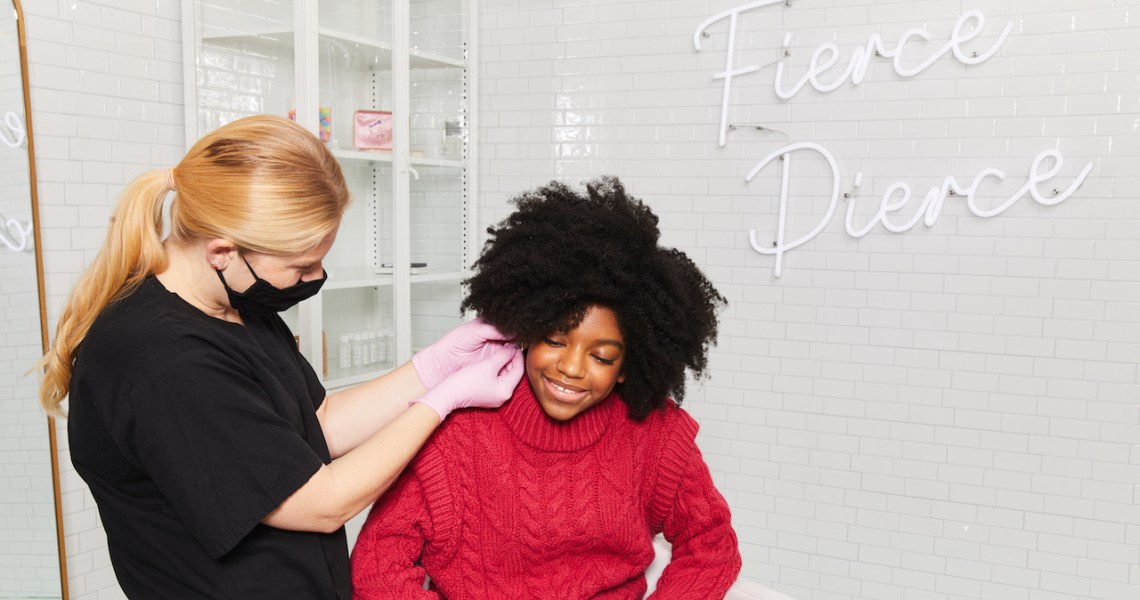Three months ago, at a time when retail sales were suffering, ear-piercing and jewelry brand Rowan opened its first piercing studio on Manhattan’s Upper East Side. Today, its appointments are fully booked weeks in advance, and it’s on track to break even on the store’s lease within a few weeks. The secret, according to Rowan’s CEO Louisa Schneider, is a combination of word-of-mouth marketing and the ongoing shift toward appointment-based retail experiences.
Schneider said the team has spent nothing on social ads through Instagram or Facebook, and only a small amount on Google ads. Instead, she said the bulk of marketing for the piercing studio has been through word-of-mouth, which the brand has cultivated by encouraging people to post photos of their newly pierced ears on social media. Additionally, the company’s benefitted from word-of-mouth from other businesses near the 3rd Avenue store. For example, Tiffany & Co. employees have been sending over people asking for a close place to get a piercing, Schneider said.
Schneider said that the successful retail brands in the future will be the ones that focus on specialized by-appointment experiences.
“I do think there’s a shift there,” she said. “Any sort of personal engagement, and anything you can’t just buy on Amazon with one-click and get it shipped to your door, that’s what’s driving foot traffic and engagement and loyalty. Brands that incorporate things like that into the retail experience are going to have the most success bringing in foot traffic.”
On the same topic — listen to the Glossy Podcast!
Subscribe: Apple Podcasts | Stitcher | Google Play | Spotify
Outside of Rowan, which raised $4 million in funding last year, fashion brands including Frame and M.M. LaFleur have refocused their retail efforts on appointment-booking and in-store services to make up for the fact that, for most standard purchases, consumers now opt to order online. Deloitte said it expects to see holiday sales made online to increase by up to 25%. So getting customers into stores requires brands offer something more than just a typical transaction.
Frame, for instance, has newly been offering in-store appointment and fitting sessions, which CEO Jens Grede said has led to a boost in brick-and-mortar traffic after it was down for many months. He said Frame relaunched private appointments in June, after they had been discontinued for months. Since then, Frame has seen a 10% increase in appointments year-over-year.
“That strategy [of focusing on appointments] is a product of how people are shopping now,” Grede said. “Most consumers don’t want to be overwhelmed by a large format store. They want an intimate, personal shopping experience. Things were going that way before this, so it really just accelerated consumer behavior rather than altering it radically.”
Earlier this week, Madewell also began offering in-store styling and fitting appointments. In September, Levi’s opened its first NextGen store, which includes several services like a tailor shop where customers can get custom products made.
While these sorts of services are what bring people into stores, Schneider said brands also need to make sure they translate into e-commerce sales, since that is where much of the apparel business is heading right now. This is especially true as Covid-19 cases in New York City surge and a second lockdown is looming.
“We are building this business with the hope that our service will lead our e-commerce business,” Schneider said. “The best opportunity for me to make a sale is at the point of experience. If I’m piercing thousands of ears a month, I really should be making thousands of e-commerce sales a month, as well.”




